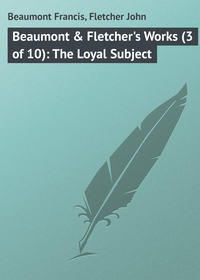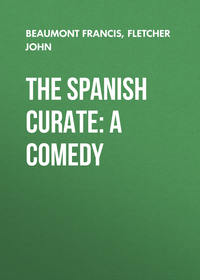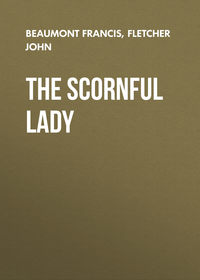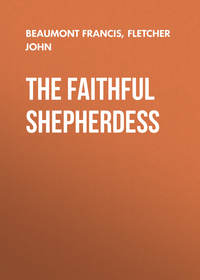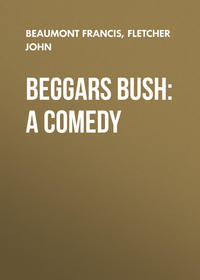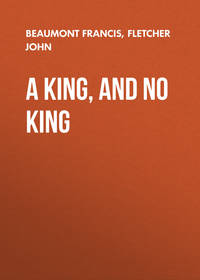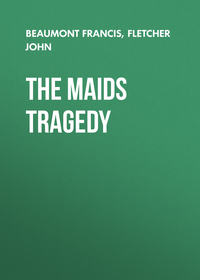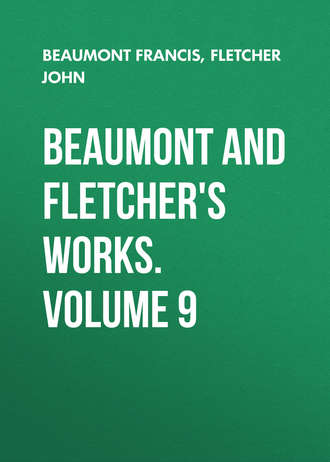
Beaumont and Fletcher's Works. Volume 9
Scena Quarta
Enter Palamon and his Knights pinion'd: Jailor Executioner, &c. Gard[Pal.] There's many a man alive that hath out-liv'dThe love o' th' people, yea, i'th' self-same stateStands many a Father with his child; some comfortWe have by so considering: we expireAnd not without mens pity. To live still,Have their good wishes, we preventThe lothsome misery of age, beguileThe Gout and Rheum, that in lag hours attendFor grey approachers; we come towards the godsYoung, and unwapper'd, not halting under CrimesMany and stale: that sure shall please the godsSooner than such, to give us Nectar with 'em,For we are more clear Spirits. My dear kinsmen.Whose lives (for this poor comfort) are laid down,You have sold 'em too too cheap.1 K. What ending could beOf more content? o'er us the victors haveFortune, whose Title is as momentary,As to us death is certain: a grain of honorThey not o'er-weigh us.2 K. Let us bid farewel;And, with our patience, anger tott'ring Fortune,Who at her certain'st reels.3 K. Come: who begins?Pal. Ev'n he that led you to this Banquet, shallTaste to you all: ah ha my Friend, my Friend,Your gentle daughter gave me freedom once;You'll see't done now for ever: pray how does she?I heard she was not well; her kind of illGave me some sorrow.Jail. Sir, she's well restor'd,And to be married shortly.Pal. By my short lifeI am most glad on't; 'tis the latest thingI shall be glad of, prethee tell her so:Commend me to her, and to piece her portionTender her this.1 K. Nay, let's be offerers all.2 K. Is it a maid?Pal. Verily I think so,A right good creature, more to me deservingThan I can quight or speak of.All K. Commend us to her.[They give their purses.Jail. The gods requite you all,And make her thankful.Pal. Adieu; and let my life be now as short,As my leave taking.[Lies on the Block.1 K. Lead courageous Cosin.1, 2 K. We'll follow cheerfully.[A great noise within, crying, run, save, hold.Enter in haste a MessengerMess. Hold, hold, oh hold, hold, hold. Enter Pirithous in hastePir.. Hold, hoa: It is a cursed haste you madeIf you have done so quickly: noble Palamon,The gods will shew their glory in a lifeThat thou art yet to lead.Pal. Can that be,When Venus I have said is false? How do things fare?Pir. Arise great Sir, and give the tidings earThat are most early sweet, and bitter.Pal. WhatHath wak't us from our dream?Pir. List then: your CosinMounted upon a Steed that EmilyDid first bestow on him, a black one, owingNot a hayr worth of white, which some will sayWeakens his price, and many will not buyHis goodness with this note: Which superstitionHear finds allowance: On this horse is ArciteTrotting the stones of Athens, which the CalkinsDid rather tell, than trample; For the horseWould make his length a mile, if't pleas'd his RiderTo put pride in him: as he thus went countingThe flinty pavement, dancing as t'were to'th' MusickHis own hoofs made; (For as they say from ironCame Musicks origen) what envious Flint,Cold as old Saturne, and like him possestWith fire malevolent, darted a Spark,Or what feirce sulphur else, to this end made,I comment not; The hot horse, hot as fire,Took Toy at this, and fell to what disorderHis power could give his will, bounds, comes on end,Forgets school dooing, being therein train'd,And of kind mannage, pig-like he whinesAt the sharp Rowell, which he frets at ratherThan any jot obeyes; Seeks all foul meansOf boystrous and rough Jad'rie, to dis-seatHis Lord, that kept it bravely: When nought serv'd,When neither Curb would crack, girth break, nor diff'ring plungesDis-root his Rider whence he grew, but thatHe kept him 'tween his legs, on his hind hoofs on end he standsThat Arcites legs being higher than his headSeem'd with strange art to hang: His victors wreathEven then fell off his head: And presentlyBackward the jade comes o'er, and his full poyzeBecomes the Riders load: Yet is he living,But such a vessell 'tis that floats but forThe surge that next approaches: He much desiresTo have some speech with you: Loe he appears.Enter Theseus, Hippolita, Emilia, Arcite, in a chairPal. O miserable end of our allianceThe gods are mightie Arcite, if thy heart,Thy worthie, manly heart be yet unbroken:Give me thy last words, I'm Palamon,One that yet loves thee dying.Arc. Take EmiliaAnd with her, all the worlds joy: Reach thy hand,Farewell: I have told my last hour; I was false,Yet never treacherous: Forgive me Cosen:One kiss from fair Emilia: 'Tis done:Take her: I die.Pal. Thy brave soul seek Elizium.Emil. I'll close thine eyes, Prince; Blessed souls be with theeThou art a right good man, and while I live,This day I give to tears.Pal. And I to honor.These. In this place first you fought: Even very hereI sundred you, acknowledg to the godsOur thanks that you are living:His part is play'd, and though it were too shortHe did it well: your day is length'ned, andThe blissfull dew of heaven do's arowze you:The powerfull Venus, well hath grac'd her Altar,And given you your love: Our Master Mars,Hast vouch'd his Oracle, and to Arcite, gaveThe grace of the Contention: So the DeitiesHave shew'd due justice: Bear this hence.Pal. O Cosen,That we should things desire, which doe cost usThe loss of our desire; That nought could buyDear love, but loss of dear love.Thes. Never FortuneDid play a subtler Game: The conquer'd triumphs,The victor has the Loss: yet in the passage,The gods have been most equall: Palamon,Your kinsman hath confest the right o'th' LadyDid lye in you, for you first saw her, andEven then proclaim'd your fancie: He restor'd herAs your stolen Jewell, and desir'd your spiritTo send him hence forgiven; The gods my justiceTake from my hand, and they themselves becomeThe Executioners: Lead your Lady off;And call your Lovers from the stage of death,Whom I adopt my Friends. A day or twoLet us look sadly, and give grace untoThe Funerall of Arcite, in whose endThe visages of Bridegroomes we'll put onAnd smile with Palamon; For whom an hour,But one hour since, I was as dearly sorry,As glad of Arcite: And am now as glad,As for him sorry. O you heavenly Charmers,What things you make of us? For what we lackWe laugh, for what we have, are sorry still,Are children in some kind. Let us be thankefullFor that which is, and with you leave disputeThat are above our question: Let's goe off,And bear us like the time.[Florish. Exeunt.EPILOGUE
I would now aske ye how ye like the Play,But as it is with School Boys, cannot say,I 'm cruell fearefull: pray yet stay a while,And let me look upon ye: No man smile?Then it goes hard I see; He that hasLov'd a young hansome wench then, show his face:'Tis strange if none be here, and if he willAgainst his Conscience let him hiss and killOur Market: 'Tis in vain, I see to stay ye,Have at the worst can come, then; Now what say ye?And yet mistake me not: I am not boldWe have no such cause. If th' tale we have told(For 'tis no other) any way content ye(For to that honest purpose it was ment ye)We have our end; And ye shall have ere longI dare say many a better, to prolongYour old loves to us: We, and all our might,Rest at your service, Gentlemen, good night.[Florish.APPENDIX
In the following references to the text the lines are numbered from the top of the page, including titles, acts, stage directions, &c., but not, of course, the headline or mere 'rules.' Where, as in the lists of Persons Represented, there are double columns, the right-hand column is numbered after the left.
It has not been thought necessary to record the correction of every turned letter nor the substitution of marks of interrogation for marks of exclamation and vice versâ. Full-stops have been silently inserted at the ends of speeches and each fresh speaker has been given the dignity of a fresh line: in the double-columned folio the speeches are frequently run on. Misprints in the Quartos and the First Folio are recorded when they appear to be interesting. A word or two from the printed text is attached to the variants recorded below in cases where the variant, by itself, would not be sufficiently clear. Altered punctuation is shown, usually, by printing the old punctuation.
THE SEA-VOYAGE
A = 1st folio. B = 2nd foliop. 1, ll. 3 to end of page. Not in A. l. 15. B] Bortswain
p. 2, l. 20. A] drunk;
p. 3, l. 3. B] ye l. 36. B] stow this. l. 37. Prayer-Book woman; l. 39. A] There
p. 4, l. 1. B] frights and terrors l. 23. A] Am I not ll. 38, 39. B] whither … whither
p. 5, l. 1. A] lowd l. 5. A] ye were l. 19. A] Gentlemen, Boat-swayne and Surgeon. l. 37. B omits] perish
p. 7, l. 37. A] living yet
p. 11, l. 28. B] 'emt l. 30. A and B] friendship?
p. 12, l. 11. B omits] as l. 29. B] delicate? l. 36. B] ro find it, to
p. 14, l. 33. A] Those l. 38. B] in in
p. 16, l. 5. A] Yea things beneath pitty shall l. 7. A] strong on's l. 29. B] do no l. 30. A] This bath'd l. 31. B] leave.
p. 18, l. 28. B] wants and
p. 24, l. 11. B] this
p. 28, l. 3. B omits] Fran.
p. 29, l. 15. A] hath l. 35. B] miseries.
p. 30, l. 4. B] thye
p. 32, l. 14. A] Sir, not l. 24. A] flung t'ee
p. 33, l. 23. A] Sawce with
p. 37, l. 19. B repeats] Ros. l. 30. A] Patrick
p. 39, l. 28. A omits] Alb.
p. 40, l. 21. A] ye
p. 41, l. 19. B] heart
p. 43, l. 23. A] i'my
p. 44, l. 37. B] two
p. 48, l. 21. B] concens
p. 51, ll. 15, 16. B omits] but … Oysters l. 36. B] will. l. 40. B] glad, for certain, wonder
p. 54, l. 20. B omits] By Heaven l. 25. B] villany l. 28. A] I,
p. 55, l. 34. A omits] all l. 35. B] memory'and
p. 56, l. 5. A] Him to. Yet B] He too yet l. 14. B] Cro. l. 17. B omits] off
p. 57, l. 1. A] I am l. 7. A omits] famine l. 17. A] Metridate
p. 58, ll. 31, 35. B] you
p. 59, l. 22. B] griex'd l. 23. B] Labourers l. 29. B] in l. 33. A] those
p. 64, l. 3. A] deprave l. 22. A] I am 1. 23. B omits] it
WIT AT SEVERAL WEAPONS
A = 1st folio. B = 2nd foliop. 66, ll. 3-28. A omits. l. 19. B] Perfidions
p. 67, l. 9. B] once.
p. 68, l. 3. B omits] Wenches, l. 17. B omits] a l. 20. A] And never l. 39. A] Wit, thou after
p. 69, l. 24. A] i'me l. 38. A omits] I
p. 70, l. 5. B] friend's l. 14. B] already, Hark? Hark, l. 29. B] friends
p. 71, l. 14. B] W'are l. 19. B] Lady? l. 20. A omits] a l. 24. A] truth
p. 72, l. 3. B] Neece? l. 33. A] those
p. 74, l. 6. B] faid l. 24 A] Pax l. 36. B] present;
p. 75, l. 4. A] rules for my l. 15. B] filius l. 26. B] Priscian he l. 36. A] were) I[?I]
p. 76, l. 22. A]poopitii in me junenem [? juvenem]
p. 77, l. 8. A] Paupertat l. 29. B] then;
p. 79, l. 19. B] Toia. l. 26. B] reported against l. 28. A] seventh l. 34. A and B omit] Pris. B] Ribsie l. 35. B] can go
p. 80, l. 9. A] have little l. 13. A] were heavier
p. 82, l. 2. A] Lady, Gentry, and l. 8. A] misery workes us l. 15. B] that, most
p. 83, l. 14. A] Wee'ne l. 32. B] Jocke's
p. 85, l. 21. B] sake' I l. 36. B omits] a
p. 86, l. 10. B] temper ll. 36,37. B] Gregery
p. 87, l. 11. B] you you
p. 88, l. 1. B] ingenuous l. 19. B] amorus l. 20. B omits] Clow. l. 30. B omits] I,
p. 89, l. 1. B] behalf l. 28. A omits] Clow. l. 29. A] Gard. Why l. 30. B omits] Clow.
p. 90, l. 27, Probably a stage direction. l. 31. A] gub'd. l. 35. B] early
p. 91, l. 11. A] stakling l. 26. A] ayld
p. 92, l. 18. A] spake
p. 94, l. 19. B omits] he l. 23. B] worse
p. 95, ll. 14-18. A gives these ll. to Wit. l. 39. A omits] Ruin. and reads Secure?
p. 97, l. 5. B omits] to l. 7. B] be the cheaper l. 12. B] list but l. 16. B] Old l. 29. B] too l. 34. B] R.
p. 98, l. 12. A] never call'd l. 15. A omits] and Fidlers boy l. 25. B] Ela
p. 99, l. 9. B] can. l. 30. A] a' my l. 32. A] You glutten l. 37. A] thou't
p. 100, l. 7. A] Thou't l. 29. A] He was
p. 101, l. 9. B] nothing. l. 35. B] Gr
p. 102, l. 6. A] a' both l. 26. A] a that
p. 104, l. 15. A] a beating l. 27. A] been bold l. 29. A] a both
p. 107, l. 26. A and B] this? l. 28. A and B] that?
p. 108, l. 9. A] a my
p. 109, l. 30. A] a' wit l. 38. A] Gentlewoman
p. 112, l. 1. B] whiffers l. 5. B] Gentlemen. l. 29. A] A' your
p. 113, l. 11. A adds] (with a Letter.) l. 26. A] yeare
p. 114, l. 17. A] a' your
p. 115, l. 9. B omits] first l. 10. B omits] him l. 11. A omits] for l. 12. A omits] Cun. l. 18. A omits] Cun. l. 19. A omits] Mir. l. 21. A] a Manchits out a'th Pantry l. 22. A] a'th Kitchin
p. 116, l. 4. A] a' the l. 23. B] unndertake
p. 119, l. 2. A] And dare to hang l. 22. A] I should l. 24. A] a Towne
p. 120, l. 32. A] love? thy
p. 121, l. 15. B] You run in l. 38. A omits this line.
p. 122, l. 8. A] groane's l. 17. A] a' thine, a' the l. 33. A omits stage direction.
p. 123, l. 11. A] I' me an l. 16. B] Cuu.
p. 125, l. 6. A omits] Cun. l. 14. A omits] A l. 23. A omits] I
p. 126, l. 36. A] Kisse
p. 130, l. 3. B] Knighthoods l. 23. B] Alls l. 32. B omits] Foot,
p. 131, l. 6. B] Sir? l. 17. B] where l. 21. B] agen; l. 22. B] Old l. 31. A gives this speech to Witty.
p. 132, l. 21. B] self? l. 28. B] permonish'd
p. 133. l. 24. B omits] L. l. 29. B] 'Till l. 39. A] did not abuse
p. 135, l. 15. A adds stage direction] Exeunt they two. l. 36. B] shall
p. 136, l. 39. B] C.
p. 137, l. 14. B] pounds l. 17. A gives this line as well as the next to Guardianess. l. 38. B] best
p. 138, l. 8. B] namh
p. 139, l. 14 A] false dye l. 34. A] have griev'd
p. 140, l. 30. A] with 't
p. 141, l. 12. B] both l. 12. A] assistance, this
THE FAIR MAID OF THE INN
A = 1st folio. B = 2nd foliop. 143, ll. 4 to end of page. Not in A.
p. 144, l. 19. B]aud l. 33. A] Misconster
p. 145, l. 18. Full-stop added after Title
p. 146, l. 6. B] beld l. 12. A] to say l. 29. B] temper. l. 31. A] How ere
p. 147, l. 6. B] want l. 31. B] too
p. 150, l. 23. B] appear what l. 29. A] with their greatnesse
p. 151, l. 33. B] care
p. 152, l. 14. A] our youthfull l. 39. B] you.
p. 153, l. 4. A] Cynthian
p. 155, l. 11. B] Turks l. 13. B] it. l. 27. A] the old l. 33. B] affections'
p. 156, l. 12. A] His merit l. 22. A] light l. 31. A wages
p. 158, l. 23. A omits] he
p. 159, l. 33. A] give him more
p. 160, l. 23. A omits] a
p. 161, l. 14. B] sear'd
p. 163, l. 8. A] too l. 13. B] Rings
p. 164, ll. 9, 10. A] fled Cesario?
p. 165, l. 6. A] Pockets l. 11. B]witnss l. 26. B] part?
p. 166, l. 38. A] be tralaunct
p. 167, l. 14. A] Switzert, was l. 31. A] steale
p. 168, l. 39. A] Cæsar. I am
p. 169, l. 1. A omits] Cæs. l. 2. A] I wish a
p. 171, l. 25. A] a doores
p. 172, l. 26. B] gudy
p. 173, l. 28. B omits] I l. 33. B] Ill l. 35. A] impostors l. 38. A] earth 'em already
p. 174, l. 21. A] well have l. 39. B] Mefs l. 40. A adds stage direction] Stooles out.
p. 178, l. 6. A omits stage direction. l. 24. A] whiles
p. 180, l. 14. A adds] Maria. How ever Bap. A Faulkners sonne: l. 22. B] unfritful l. 26. A] her love
p. 182, l. 13 B] Remembrace
p. 184, l. 22. B] cheifly
p. 186, l. 1. A] may gusse l. 12. A] greive thee l. 20. A gives this line to Bian. l. 35. A] food
p. 187, l. 35. A] vow
p. 188, l. 19. A] mercy so this
p. 191, l. 13. A] thoughts
p. 192, l. 8. B] care l. 29. B] to
p. 194, l. 13. B] woman l. 23. B] Faro. l. 34. A] Caranta
p. 196, l. 36. A] see to
p. 198, l. 10. B] Engilsh l. 14. A] Podrithoes
p. 199, l. 14. A omits] to
p. 200, l. 19. A] Greeke-land
p. 201, l. 10. B] Padant l. 15. A] that o's
p. 203, l. 22. A] testimony,
p. 208, l. 9. B] Albar. l. 13. B] thee? l. 15. A] thee; l. 15. A] afflicted l. 17 A] awake
p. 209, l. 23. B] handing l. 37. B] aud
p. 210, l. 32. B] on
p. 211, l. 17. B omits] the
p. 212, l. 11. B] Couriers l. 16. A] slighted
p. 219, l. 6. A] preach l. 22. B] a a
CUPID'S REVENGE
A = the 1615 quarto. B = the 1630 quarto. C = the 1635 quarto. D = the 2nd folioMrs Arnold Glover has kindly collated the three quartos in the Dyce collection, for the purpose of the following notes; and Mr R.F. Towndrow has kindly collated the three in the Bodleian.
(A) CUPIDS | REVENGE. |(⁂)| As it hath beene divers times Acted by | the Children of her Majesties | Revels. ¶ By John Fletcher. | LONDON | Printed by Thomas Creede for Josias Harison, and are to bee solde at the Golden Anker in | Pater-Noster-Row. 1615.
The Printer to the ReaderIt is a custome used by some Writers in this Age to Dedicate their Playes to worthy persons, as well as their other works; and there is reason for it, because they are the best Minervaes of their braine, and expresse more puritie of conceit in the ingenious circle of an Act or Scæne, then is to be found in the vast circumference of larger Volumnes; and therefore worthy an answerable Mecænas, to honour and bee honoured by them. But not [h]aving any such Epistle from the Authour (in regard I am not acquainted with him) I have made bolde my selfe, without his consent to dedicate this Play to the Juditious in generall, of what degree soever; not insinuating herein with any, be they never so great, that want judgement, for to them it belongs not, though they pay for it, more then in this respect, that like Æsops Cocke, having met with a precious Stone by accident, they knew not the true use thereof, but had rather have a Barlie-corne to their humour, then a perfect Diamond. But leaving them to their ignorance, I once againe dedicate this Booke to the Juditious, some whereof I have heard commend it to be excellent, who, because they saw it Acted, and knew what they spake, are the better to be beleeved: and for my part I censure it thus, That I never red a better.
(B) CUPIDS | REVENGE. | AS IT WAS OFTEN | Acted (with great applause) | by the Children of | the Revells. Written by Fran. Beaumont & Jo. Fletcher Gentlemen. | The second Edition. | LONDON: | Printed for Thomas Jones, and are to be sold | at his Shop in Saint Dunstanes Churchyard | in Fleetstreet. 1630.
(C) CUPIDS | REVENGE. | AS IT WAS OFTEN | Acted (with great aplause) by | the Children of the Revels. | Written by Fran: Beaumont, and Jo: Fletcher, Gentlemen. | The third Edition. | LONDON, | Printed by A.M. 1635.
p. 220, ll. 2-25. Not in A. l. 2. Not in B. C] The Actors are these. l. 18. Not in B or C. l. 31. D] day.
p. 221, l. 33. D] grant
p. 222, l. 38. B-D] erect
p. 223, l. 20. D] suits. l. 32. B-D] Lord l. 40. C] affection. D] affection [comma added, as in A and B]
p. 224, l. 15. D] suppied l. 20. A] Flesh will l. 22. D] remember l. 24. C] and grew
p. 225, l. 33. D] men. l. 37. D] rise.
p. 226, l. 1. C] To great l. 18. A] be rewarded l. 27. B and D] harms. l. 34. C] Rites
p. 227, l. 4. D] of? l. 5. D] Image l. 14. D] our l. 15. A, B and D] will some l. 33. C] fly l. 35. D] taken off l. 36. C] despis'd
p. 228, l. 2. D] Nor smoaks l. 36. B and D] selfe? C] selfe;
p. 229, l. 6. D omits] Cleo. l. 28. D] I'm l. 34. A] does. l. 37. D] think.
p. 230, l. 40. D] withal
p. 231, 1. 18. A] yet my l. 31. A – C] This five l. 32. D] hold
p. 234, l. 4. A] And will l. 23. A and B] Has l. 26. C] ye must needs l. 30. D] this
p. 235, l. 6. C and D] unhappy l. 9. D] this l. 11. C] my dart
p. 236, l. 12. A] you doe l. 15. A] thought l. 19. A] tell the
p. 237, l. 12. D] here l. 13. D] on l. 19. D] steem
p. 238, l. 2. A omits] love l. 9. D] corrupt'st? l. 10. D] than l. 26. A – C] mine
p. 239, l. 34. D] here


